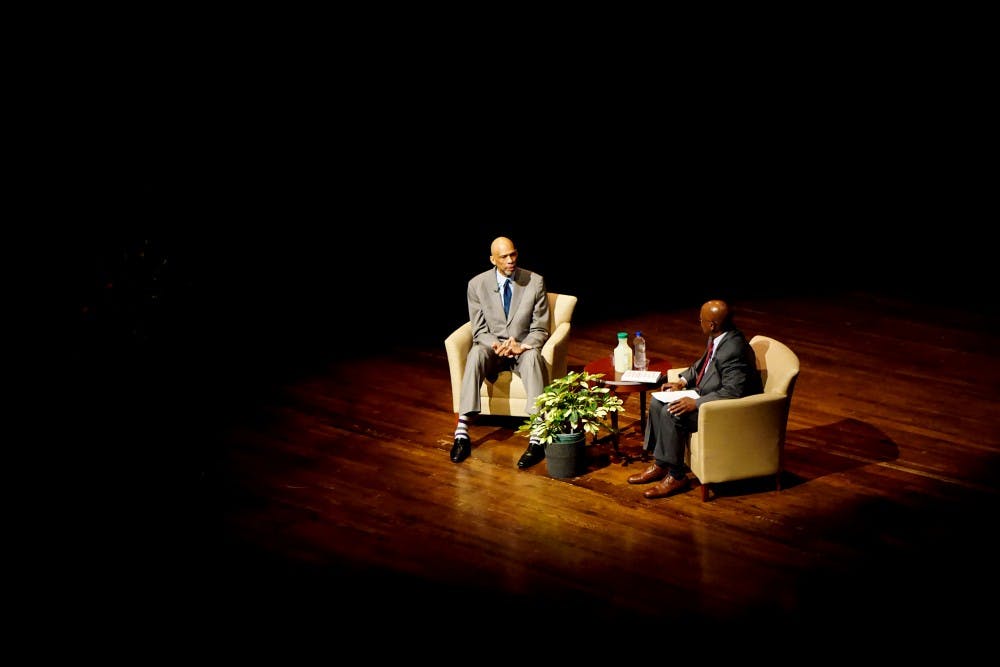An audience member asked Kareem Abdul-Jabbar for three pieces of advice he could give to students and athletes. Abdul-Jabbar turned to a full Hall Auditorium and picked one: "Failing to prepare is preparing to fail."
In an hour-and-a-half lecture that delved into contentious subjects such as education, race, religion and politics, Abdul-Jabbar was thoroughly prepared to discuss any topic that was addressed by moderator Gerald Yearwood, the senior director emeritus of Diversity Affairs at Miami, or by a curious audience member.
Abdul-Jabbar, a six-time NBA champion and the all-time NBA scoring leader, visited Miami's campus on Monday, April 3, to present his lecture "Beyond Black and White" as part of the Miami University Lecture Series.
In addition to his accolades on the court, Abdul-Jabbar is a recipient of the Presidential Medal of Freedom, has been appointed as a Cultural Ambassador of the United States and has received the Double Helix Medal for his contributions to cancer research. He has also pieced together a respectable career in the arts with multiple New York Times best-selling novels, roles in the movies "Airplane!" and "Game of Death" and appearances in many television series.
In accordance with its title, Abdul-Jabbar's lecture centered around the current state of racial affairs in America and the efforts to alleviate burdens created by racial tension. Although he was quick to point out recent tragedies and the ever-widening gap growing between races, Abdul-Jabbar ensured that his lecture should be interpreted as a call to action rather than a call to arms.
Throughout his lecture, he spoke of tolerance and acceptance for all members of the human race regardless of the color of their skin and stressed the importance of education.
"Poverty is the result of a lack of education and being unable to cope with the struggles that life puts [us] through," he said.
The seven-foot-two Abdul-Jabbar spoke in short sentences.
He insisted that black Americans understand the importance of a S.T.E.M. education and realize the improbability of a career in sports. Rather than becoming the next LeBron James, Denzel Washington or Beyonce, Abdul-Jabbar stated that he would rather see "black Americans [starting] a revolution where they are known for being the suppliers of engineers."
In regard to sports, the majority of the questions that Abdul-Jabbar addressed were related to former 49ers quarterback Colin Kaepernick's recent actions. While Abdul-Jabbar admired the cause that Kaepernick stood for, he believed that Kaepernick had "too much hostility in his output." However, he did admire the direction that Kaepernick took and believed that the situation ended up creating a conversation that has caused more good than harm.
Abdul-Jabbar also expressed his displeasure for the current trend of one-and-done players in college basketball. He believed that, again, the idea of higher education and a college degree are being devalued in the eyes of young African Americans.
"If I hadn't pursued an education, I would not have had anything to do outside of professional basketball," he said.
When prompted asked about his conversion to Islam and his opinions on the current perceptions of the religion, Adbul-Jabbar again adopted an open-minded view. His views on religion centered around humanitarian ideologies, and he did not believe that religion was a matter of race.
"Islam does not teach us to murder and kill," he said. "We've seen what distorted versions of Islam can cause. [...] All kinds of people go to heaven and hell."
After cracking a couple of sly jokes about our current political climate, Abdul-Jabbar addressed the role that race has come to play in politics. He stressed the importance of speaking up when slighted and of understanding one's worth regardless of one's upbringing.
When many students expressed their displeasure with the lack of diversity on Miami's campus, Abdul-Jabbar encouraged them to mingle with students who may not appear to share their same values.
"Make a friend that doesn't look like you," he said. "That's a smart thing to do."
Though Abdul-Jabbar has experienced racial discrimination firsthand and was on a first-name basis with some of the most prominent civil rights leaders of his time, his answers largely focused on showing both sides of the conversation.
As Abdul-Jabbar's lecture drew to a close, a student asked him for advice on finding success as a minority in today's world.
Abdul-Jabbar smiled and answered easily: "Just find out who needs help and ask. The whole idea of success is asking questions and knowing what needs to be dealt with."
The 750-person audience stood and applauded as Abdul-Jabbar walked off the stage -- as inconspicuously as a seven-foot-two global icon could.

